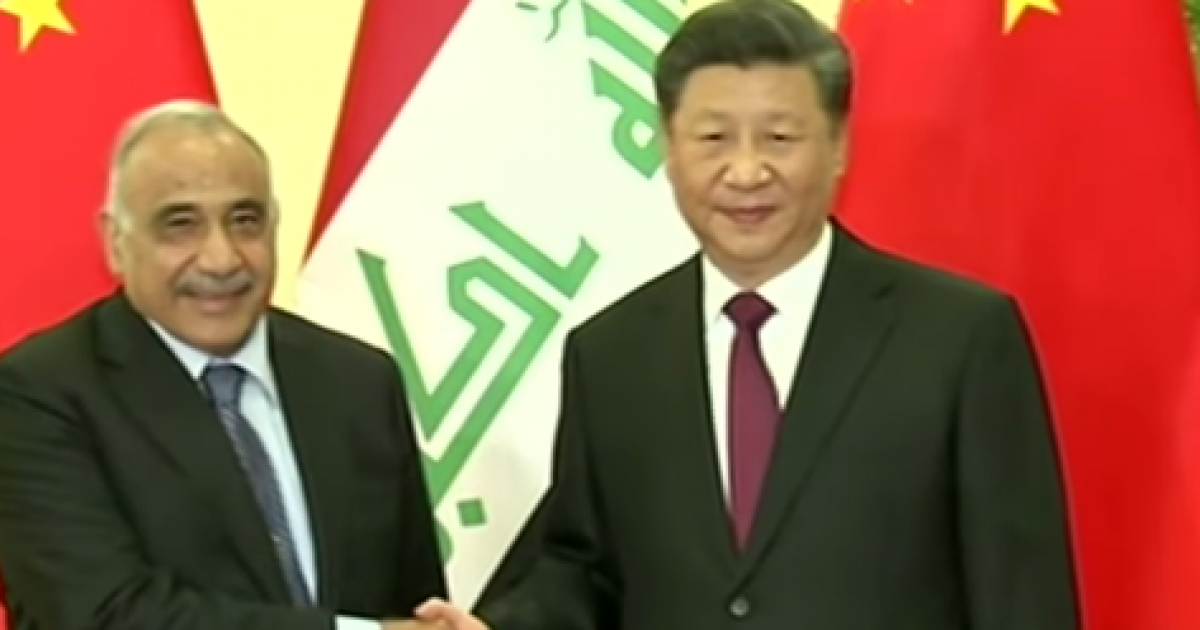
While everyone is fixating on Iran and Iraq, China is benefiting tremendously from the U.S. government’s foreign policy blunders in the Middle East.
Simon Watkins noted that “Iraq has enormous and still relatively underdeveloped oil and gas reserves, it is an irreplaceable geographical stepping stone in China’s ‘One Belt, One Road’ programme, and it is in need of major ongoing funding. China already has leverage over Iraq as the leading oil company (Rosneft) of its close geopolitical ally, Russia, already has effective control over the oil and gas infrastructure of the north Iraq semi-autonomous region of Kurdistan, and Chinese companies operate on a number of fields in south Iraq.”
Certain developments are pointing to Iraq becoming a Chinese client state.
One of these was the announcement from Iraq’s Finance Ministry that the Middle Eastern country began exporting 100,000 barrels per day (bpd) of crude oil to China in October. This is part of a 20-year oil-for-infrastructure deal that the two countries struck back in September.
According to OilPrice.com, the overall deal was agreed to during then-Prime Minister Adel Abdul Mahdi’s visit to Beijing in September. This meeting dealt with expanding China’s then $20 billion of investment in Iraq in addition to the approximately US $30 billion in trade between the two countries.
According to statements regarding the deal, Chinese firms Zhenhua Oil and Sinochem were the principal importers of the Iraqi barrels discussed in the deal. The China Export and Credit Insurance Corporation will conduct trade financing with regards to these exports, as well as future exports.
This arrangement falls in line with China’s broader plan for both Iraq and Iran as it tries to expand its presence in the Middle East just as it has done in Africa. Many view this expansion as a form of 21st century colonialism.
China will start forging these relations with the oil and gas sector and expand outward. Not only is China receiving reductions on buying Iranian oil and gas, China now has the opportunity to build factories in both Iran and Iraq and construct infrastructure such as railways. Management staff from Chinese companies will preside over these projects.
Another announcement was made regarding new developments in the Iraqi-Jordanian oil pipeline project. This $5 billion pipeline will run from Rumaila oifield in Iraq’s Basra Governorate to the Jordanian port of Aqaba.
The first phase of this project will feature the installation of a 700-kilometer-long pipeline with a capacity of 2.25 million bpd within the Iraqi territories of Rumaila and Haditha.
The second phase consists of setting up a 900-kilometre pipeline in Jordan from Haditha to Aqaba with a capacity of 1 million bpd. Due to how contractors will be expected to front-load all of the financing for the projects in connection to this pipeline, Iraqi leaders believe that Chinese and Russian companies will dominate these offers.
While the U.S. dropped trillions in misguided nation-building efforts, superpowers like China are turning countries into economic colonies.
The U.S. government will need to reevaluate its foreign policy and trade priorities from here going forward.



